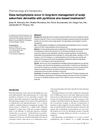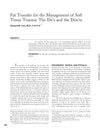 November 2002 in “Dermatologic Surgery”
November 2002 in “Dermatologic Surgery” Scalp reduction gives the most natural result for significant crown baldness, despite potential complications, and a systematic approach to surgical hair restoration results in few complications and high graft survival.
 281 citations,
January 2013 in “British Journal of Dermatology”
281 citations,
January 2013 in “British Journal of Dermatology” Manage vitiligo with treatments, address emotions, and use camouflage techniques.
 218 citations,
April 2012 in “British Journal of Dermatology”
218 citations,
April 2012 in “British Journal of Dermatology” Guidelines suggest various treatments for alopecia areata, but leaving it untreated is also an option as 80% cases may recover on their own.
 65 citations,
July 2013 in “International Clinical Psychopharmacology”
65 citations,
July 2013 in “International Clinical Psychopharmacology” Mood stabilizers like lithium and anticonvulsants have side effects that can lead to patients stopping their medication, and managing these effects is important for treatment adherence.
 48 citations,
February 2017 in “Journal of Cosmetic Dermatology”
48 citations,
February 2017 in “Journal of Cosmetic Dermatology” The conclusion is to use scalp cooling, gentle hair care, and treatments like minoxidil for managing hair loss from chemotherapy, and stresses the need for more research and collaboration in this area.
 42 citations,
April 2012 in “Seminars in Oncology”
42 citations,
April 2012 in “Seminars in Oncology” Targeted cancer therapies often cause skin problems that need careful management to improve patient quality of life and treatment success.
 30 citations,
July 2017 in “BioEssays”
30 citations,
July 2017 in “BioEssays” Activating NRF2 might help treat hair disorders by improving antioxidant defenses.
 30 citations,
November 2008 in “Facial Plastic Surgery”
30 citations,
November 2008 in “Facial Plastic Surgery” The conclusion is that the best approach for treating Female Pattern Hair Loss is a combination of different treatments.
 16 citations,
December 2008 in “International Journal of Dermatology”
16 citations,
December 2008 in “International Journal of Dermatology” Long-term use of pyrithione zinc shampoos remains effective for scalp seborrheic dermatitis, with decreased effectiveness likely due to not following treatment instructions rather than the treatment itself.
 8 citations,
November 2010 in “Facial Plastic Surgery”
8 citations,
November 2010 in “Facial Plastic Surgery” Fat transfer can be effective for soft tissue trauma if the patient is chosen carefully and the procedure is done correctly.
 6 citations,
September 2012 in “Clinical Interventions in Aging”
6 citations,
September 2012 in “Clinical Interventions in Aging” Honokiol might help reduce male skin aging by maintaining testosterone levels.
 4 citations,
November 2012 in “Obstetrics, Gynaecology & Reproductive Medicine”
4 citations,
November 2012 in “Obstetrics, Gynaecology & Reproductive Medicine” Lifestyle changes and clomiphene are first-line treatments for infertility in women with PCOS, with other options available if these fail.
 3 citations,
August 2023 in “Drug safety”
3 citations,
August 2023 in “Drug safety” Proactive monitoring and management are essential to maximize the benefits of Trastuzumab Deruxtecan while minimizing serious side effects.
 June 2023 in “International journal of biology, pharmacy and allied sciences”
June 2023 in “International journal of biology, pharmacy and allied sciences” New medications are improving depression treatment, emphasizing accurate diagnosis and chronic care.
 October 2010 in “Cambridge University Press eBooks”
October 2010 in “Cambridge University Press eBooks” Lifestyle changes like diet and exercise are key for treating overweight women with polycystic ovary syndrome.
 391 citations,
November 2015 in “Journal of Clinical Lipidology”
391 citations,
November 2015 in “Journal of Clinical Lipidology” The guidelines suggest lifestyle changes, diet adjustments, and personalized medication to manage dyslipidemia and reduce heart disease risk.
 110 citations,
October 2019 in “Translational Andrology and Urology”
110 citations,
October 2019 in “Translational Andrology and Urology” More men are getting benign prostatic hyperplasia, and there are many treatments, from medication to surgery, with new methods being developed.
 15 citations,
December 2020 in “Pharmacology Research & Perspectives”
15 citations,
December 2020 in “Pharmacology Research & Perspectives” Blocking enzymes that help the virus enter cells could be a promising way to treat COVID-19.
 14 citations,
November 2020 in “International Journal of Molecular Sciences”
14 citations,
November 2020 in “International Journal of Molecular Sciences” Advanced therapies like gene, cell, and tissue engineering show promise for hair regrowth in alopecia, but their safety and effectiveness need more verification.
 1 citations,
August 2023 in “Frontiers in immunology”
1 citations,
August 2023 in “Frontiers in immunology” Traditional Chinese medicinal foods may help manage long-term post-COVID symptoms.
 August 2024 in “Indian Journal Of Clinical Practice”
August 2024 in “Indian Journal Of Clinical Practice” A balanced diet and healthy lifestyle help manage PCOS symptoms.
 May 2024 in “International Journal of Advanced Academic Studies”
May 2024 in “International Journal of Advanced Academic Studies” Vitamin E helps reduce PCOS symptoms and improves hormonal balance.
 September 2019 in “The journal of investigative dermatology/Journal of investigative dermatology”
September 2019 in “The journal of investigative dermatology/Journal of investigative dermatology” Hair follicles repair 3D injuries using a 2D healing process.
 213 citations,
June 2017 in “Rheumatology”
213 citations,
June 2017 in “Rheumatology” The guidelines suggest a detailed approach to diagnosing and treating lupus, with a focus on regular check-ups, personalized medicine, and a range of drug options for different cases.
 156 citations,
September 2014 in “British journal of dermatology/British journal of dermatology, Supplement”
156 citations,
September 2014 in “British journal of dermatology/British journal of dermatology, Supplement” Accurate diagnosis and effective oral treatment are key to managing tinea capitis and preventing its spread.
 102 citations,
December 2017 in “The journal of investigative dermatology. Symposium proceedings/The Journal of investigative dermatology symposium proceedings”
102 citations,
December 2017 in “The journal of investigative dermatology. Symposium proceedings/The Journal of investigative dermatology symposium proceedings” Restoring hair bulb immune privilege is crucial for managing alopecia areata.
 45 citations,
July 2002 in “The Neurologist”
45 citations,
July 2002 in “The Neurologist” A comprehensive approach to educating patients and managing side effects is crucial for improving adherence to multiple sclerosis treatments and patient quality of life.
 26 citations,
May 2014 in “BioEssays”
26 citations,
May 2014 in “BioEssays” Using neurohormones to control keratin can lead to new skin disease treatments.
 14 citations,
October 2019 in “Journal of Cellular Physiology”
14 citations,
October 2019 in “Journal of Cellular Physiology” Micrografts promote hair growth in androgenetic alopecia treatment.
 9 citations,
February 2022 in “Dermatology and therapy”
9 citations,
February 2022 in “Dermatology and therapy” An emollient PLUS balm with ADE-G1 significantly improved skin dryness and quality of life in cancer patients with xerosis.





























